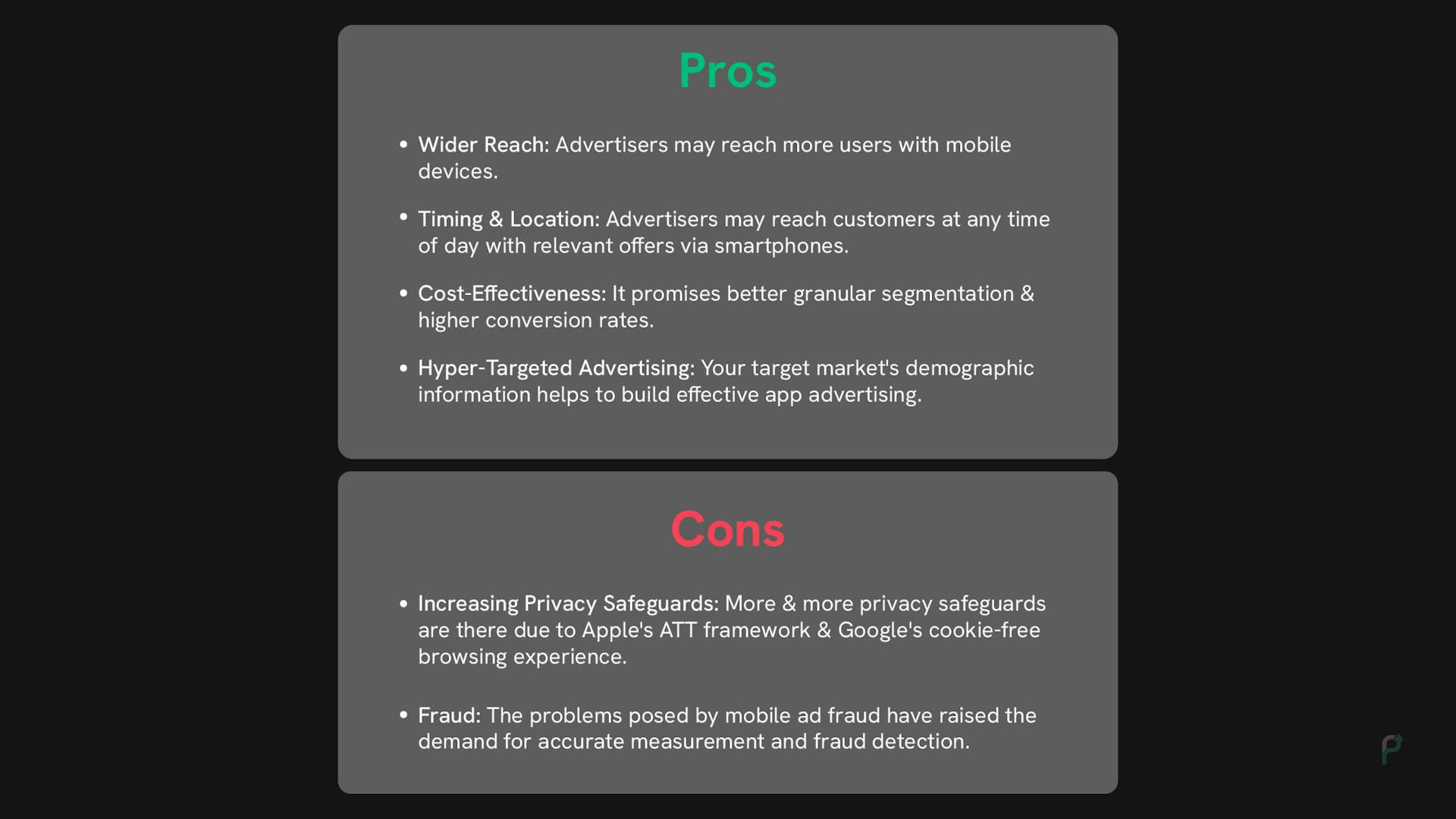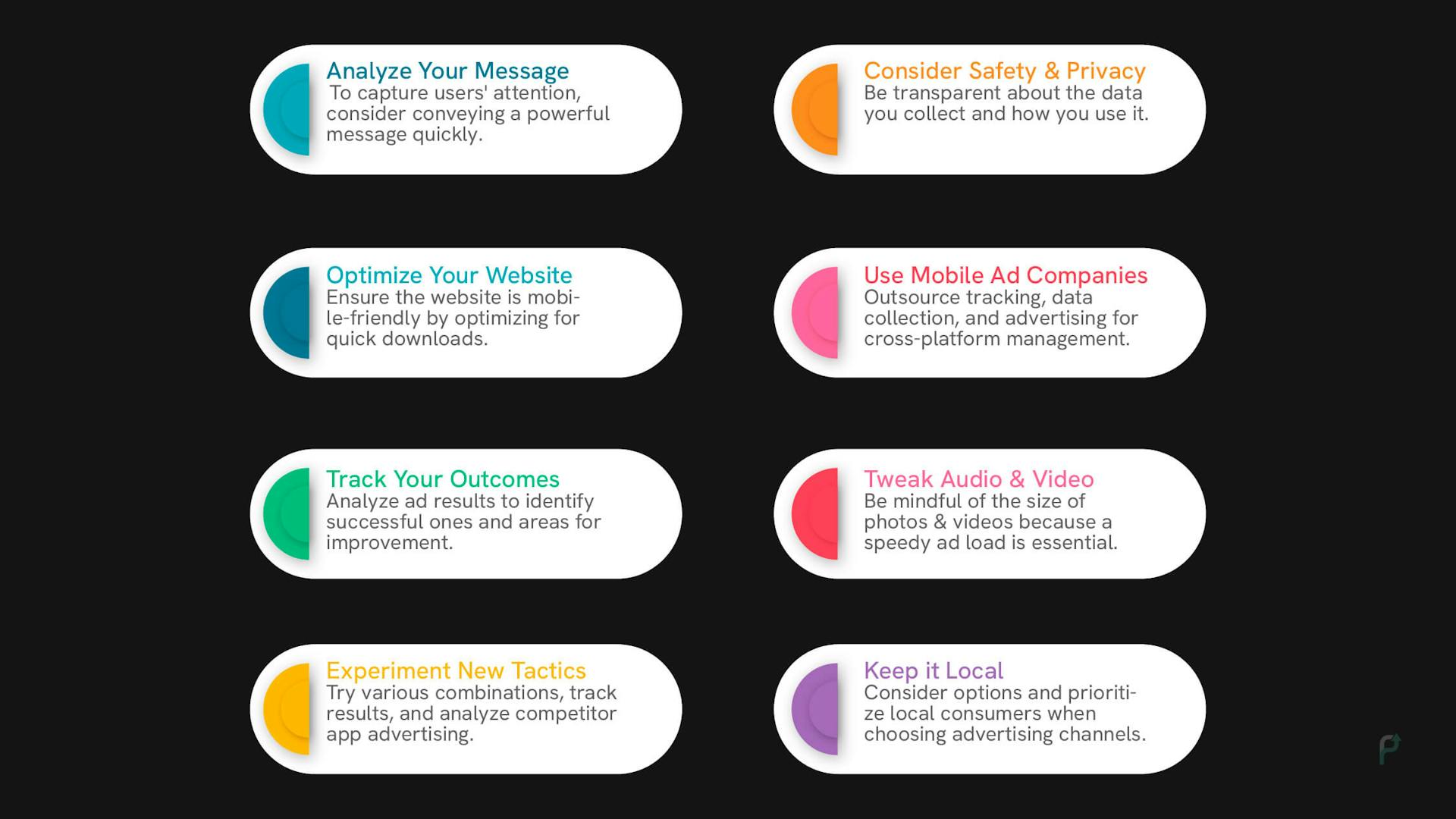- In this article, we will talk about what mobile app advertising is, give some examples, and go through the various ad types.
- In our final section, we'll discuss the advantages and disadvantages of app advertising and present excellent suggestions for incorporating mobile app advertising into your next mobile advert campaign.
In the modern digital era, people use the internet to discover solutions to issues they confront every day. Everything is available online, from entertainment and education to jobs and businesses. It should come as no surprise that the advertising sector has also experienced a rebirth. In this digital era, the best approach to quickly market your business is through mobile app advertising.
App advertising is a powerful app marketing strategy that enables trades to associate with customers through mobile devices. Mobile app advertising gives users relevant ads based on their search preferences and viewing histories to raise consumer awareness of businesses, products, and services.
Let's get started by discussing how mobile app advertising functions. We’ll also offer some tips to develop an app advertising plan if you're seeking a more direct method to bring your products to consumers' attention.
What is Mobile App Advertising
Any type of advertising that appears on mobile devices like smartphones and tablets is mobile app advertising.
Businesses can use push notifications, SMS text ads, or banner ads placed on mobile websites to advertise on these devices. In addition, downloadable apps and mobile games may include them as well.
Simply put, it is a form of paid promotion that appears on tablets and smartphones and is one of the most efficient forms of advertising in the modern digital era. Included are any interactive channels that advertisers use to spread brand information, news, or promotions via mobile devices or networks.
How Mobile Advertising Works
Whether a user is using an app, conducting a web search, or browsing a website, mobile app advertising targets them with advertisements for a product or service. It typically focuses on grabbing viewers' attention and is to the point.
To achieve this, marketers employ straightforward yet engaging videos, discounts, or offer codes attached to images or banner ads. When users click these ads, they are taken to a particular web page or product. Advertisers often consider the product market, the company's budget, and the goal of the advertisement while designing advertisements.
Methods of Mobile Advertising
To reach customers, advertisers utilize a combination of mobile app advertising strategies. Based on the bidding method you select, calculate the cost of advertising into your budget.
Following are some of the bidding strategies.
- Cost per click: This approach involves charging the advertiser for each click on a mobile advertisement or website.
- Cost per mille: The price an advertiser pays for every thousand ad impressions on a web page is known as cost per mille (CPM). Every time an advertisement appears on a website or app is an impression.
- Cost per install: The advertiser gets charged using this strategy for each app download they get.
- Cost per action: The advertiser is charged each time a specific action is performed within an app or on a website. The activities could be downloading an offer, signing up for it, making a transaction, etc.
What are the Advantages of Mobile Advertising
Mobile app advertising facilitates advertisers to be in steady connection with their target audience while they are on the go. More than any other form of marketing, mobile app advertising is individualized. It allows marketers to gain access to the consumer's lifestyle and use whatever form of media that is appropriate.
Brands have a better chance of turning viewers into paying customers if they are more accessible to them. Mobile ads use a variety of ad formats and styles to produce user-friendly adverts that promote brands. It offers greater personalization, is more flexible, and delivers outstanding results.
A few of the benefits of mobile app advertising are as follows:
- Larger Audience
- Easy Tracking
- Quick Response
- Low Cost
- Geo Targeting
Mobile App Advertising Pros and Cons
Let's discuss the possibilities and challenges in the field of mobile app advertising now that you are acquainted with the fundamental concepts. There are more concerns to tackle as privacy laws change more frequently. Here are the details.
Pros:
- Wider Reach - Since mobile phones are now widely used, advertisers may reach more users through mobile devices.
- Timing and location - Due to the ubiquitous nature of smartphones, advertisers may utilize geolocation to send relevant offers to customers who have opted in, during the most convenient times of the day.
For instance, if you use an Android or an iOS 14+ device and give your consent to receive marketing offers, you might receive a Starbucks promotion when you're a block away from the store. As an alternative, a GPS navigation app might recommend you to stop at a particular gas station. - Cost-effectiveness - Notwithstanding the recent apprehensions regarding access to user-level data, mobile app advertising still promises higher conversion rates and better granular segmentation than conventional channels, which tends to be considerably more cost-effective for advertisers at scale.
- Hyper-targeted advertising - If your iOS 14+ users have authorized the collection of their data, mobile app advertising makes use of valuable data points about your target market. It contains information about a person's demographics, device, mobile connection, operating system, preferences, hobbies, location, routines, and spending patterns.
 Mobile App Advertising Pros and Cons
Mobile App Advertising Pros and ConsCons:
- Increasing Privacy Safeguards - As more and more privacy precautions are put into place, as evidenced by Apple's introduction of the ATT framework and Google's transition to a cookie-free browsing experience.
- Ad Fraud - Since the beginning of the practice, mobile ad fraud has presented a challenge for marketers. Bad players will be where the money is, whether it is through bots, fake installs, device farms, or install hijacking.
And as mobile app advertising expenditure continues to rise dramatically, there will be a heightened need for more precise measurement and fraud detection.
Tips for Mobile Advertising Implementation
Building your strategy begins with planning and objective considerations, even though it may take some practice to understand the numerous mobile ad distribution platforms and approaches. To learn more about how to present your next mobile advertisement, read the tips we've provided below:
- Analyze Your Message: It's essential to specify what you want the mobile advertisement to say or do because there is a limited window of opportunity for grabbing a user's attention. Consider how to provide a concise but impactful message.
- Optimize Your Website: By adjusting page layouts to match different screen sizes and optimizing information for quick downloads, you may check whether your website is mobile-friendly. To see if your website host has alternatives for setting up a mobile version of your site, check with them.
- Track Your Outcomes: You may understand which advertisements are effective and where modifications need to be made by monitoring your results. Make the most of your budget by employing tried-and-true strategies and avoiding outmoded or ineffective marketing.
- Experiment New Tactics: To target mobile users, test various techniques and tactics. Think about various combinations, monitor the results, or research your competitors to understand how they are using mobile app advertising.
 Mobile App Advertising Tips
Mobile App Advertising Tips- Consider Safety & Privacy: Be upfront about the information you gather and how you utilize it, whether handling your mobile app advertising in-house or outsourcing it. Make sure that customers may shop for your goods and services with assurance.
- Use Mobile Ad Companies: You can hire advertising agencies to handle tracking, data collection, and advertising. These businesses specialize in app marketing and can manage tasks like messaging updates while ensuring your ads perform properly across all platforms.
- Tweak Audio and Video: Be mindful of the size of photos and videos because advertisements are informational tidbits. A speedy ad load is necessary so that users may view them before moving on to another page.
- Keep it Local: Consider location choices and try to focus on your local customers when setting advertising objectives. Customers might be looking for something nearby, and your timely advertisement could point them on the right path.
In Conclusion
Mobile app advertising is what you would call a must-have strategy in this digital era that will help you expand your brand, especially with the rising level of creativity available.
Advertising on mobile apps is a viable and economical tactic that delivers beneficial outcomes without dropping the standard of the campaign. Brands only need to be present to be recognized out there because consumers are practically always scanning the location of the ad placement through their everyday smartphone usage.
Understanding which KPIs define success for your particular app is the most efficient technique to gauge mobile app advertising consequences. Make sure your data is accurate so that you can test successfully and take appropriate action.
Keep checking back because we'll bring you some incredible information in upcoming posts.
Finally, spread the word about this article to anyone you believe would be interested in learning more about mobile app advertising!
The only ad platform built for developers by developers.
Contact us now for a product that fits your needs! It’s quick, simple and easy.



